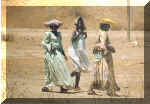HISTORY
& POLITICS
 Namibia enjoys one of the few
democratic dispensations in Africa, as evidenced, for instance, by a functioning
parliamentary system, observance of civil and human rights, and the holding of regular
elections at local, regional, and national levels. The visitor will find a society in
which issues relating to the management of the state, and civil rights, are often debated
with vigour.
Namibia enjoys one of the few
democratic dispensations in Africa, as evidenced, for instance, by a functioning
parliamentary system, observance of civil and human rights, and the holding of regular
elections at local, regional, and national levels. The visitor will find a society in
which issues relating to the management of the state, and civil rights, are often debated
with vigour.
This democratic
dispensation has been in effect since independence in 1990, and was hard-won after a
century of colonialism and resistance to foreign occupation. The first colonial seizure
was effected by Germany, which established control over a large area of the territory form
the 1880s onward. South African troops conquered South West Africa (the colonial name for
Namibia) during the First World War, and the territory became a mandate of the League of
Nations, with control vested in South Africa. Growing internal resistance to South African
rule, encouraged by decolonisation in large parts of the world, were reflected from the
1960s onward in intensified efforts through the United Nations to bring about independence
for Namibia. This was finally achieved in 1990, after a year during which the UN
settlement plan was implemented under the guardianship of a large UN contingent stationed
in Namibia.
There were many acts
of resistance to colonial occupation. One of the best known is the war of 1904-07 between
the German forces, and the Herero and Nama people. This war is infamous for the
catastrophic effect it had on the indigenous people. Estimates are that up to 80% of the
Herero people, and up to 50% of the Nama people, were killed at this time. A major cause
of this war was the occupation of large tracts of land for use by colonists. Land
alienation continued and expanded under South African rule.
From the early 1960s,
Namibians began to go into exile to wage the struggle against South African occupation.
The policy of apartheid - institutionalised racism - was a primary focus of dissent and
resistance. By the mid- 1980s, there were about forty thousand Namibians in exile, most of
them associated with the South West African People's Organisation (SWAPO). The armed
struggle began in the mid-1960s, and intensified in the 1970s and early 1980s,
particularly after Angola could be used as a base for the resistance forces. The South
Africans responded by militarising Namibia, and by imposing martial law throughout large
areas of the country. Human rights violations by the South Africans, such as the use of
torture and detention without trial, increased the depth of resistance by Namibians to the
colonial presence.
The national elections
of 1989 were won by SWAPO, which increased its majority in the national election of 1994.
Former
president Dr Sam Nujoma was the first president of the country and stayed on
until February 2005.
Today Mr
Hifikepunye Pohamba is the president of the Republic of Namibia.
A brief survey such as
this cannot do justice to the complexities of alliances, and shifts of power and
influence, that have characterised Namibia during the last two centuries. The interested
visitor is advised to avoid some of the more specious and popular publications, which
often repeat colonially-generated myths about Namibian history. Fortunately the better
bookshops in Windhoek and elsewhere do sell publications that reflect serious and
reputable attempts to engage in Namibian historiography. However, excellent as a number of
these publications are, it can be said that Namibian history is still very much in the
process of being written.
 Namibia enjoys one of the few
democratic dispensations in Africa, as evidenced, for instance, by a functioning
parliamentary system, observance of civil and human rights, and the holding of regular
elections at local, regional, and national levels. The visitor will find a society in
which issues relating to the management of the state, and civil rights, are often debated
with vigour.
Namibia enjoys one of the few
democratic dispensations in Africa, as evidenced, for instance, by a functioning
parliamentary system, observance of civil and human rights, and the holding of regular
elections at local, regional, and national levels. The visitor will find a society in
which issues relating to the management of the state, and civil rights, are often debated
with vigour.